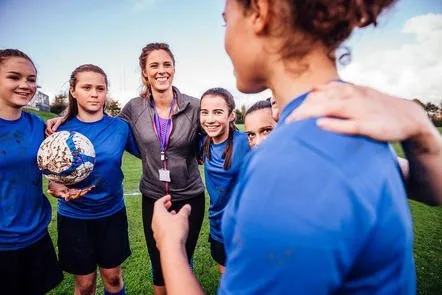
Coaching the Mental Game 
This course will teach you how to coach the mental game of sports and business. You'll learn how to create an empowering culture, use servant leadership, and apply player-centred approaches to foster an environment that enables people to perform to their potential. You'll also explore frameworks, principles, and strategies for coaching players mentally. Suitable for anyone interested in sports or business coaching. ▼
ADVERTISEMENT
Course Feature
![]() Cost:
Cost:
Free
![]() Provider:
Provider:
Futurelearn
![]() Certificate:
Certificate:
Paid Certification
![]() Language:
Language:
English
![]() Start Date:
Start Date:
13th Aug, 2018
Course Overview
❗The content presented here is sourced directly from Futurelearn platform. For comprehensive course details, including enrollment information, simply click on the 'Go to class' link on our website.
Updated in [May 25th, 2023]
This course provides an overview of the frameworks, principles and strategies for coaching players mentally. Participants will learn how to foster an environment that enables people to perform to their potential and understand how to coach the mental game. Topics covered include the importance of culture in sport, servant leadership, and player-centred approaches. The course is suitable for anyone with an interest in sports or business coaching, but may be of particular interest to those already working in the area.
[Applications]
Upon completion of this course, participants should be able to apply frameworks, principles and strategies for coaching players mentally. They should be able to create an environment that enables people to perform to their potential and understand how to coach the mental game. Participants should also be able to foster an empowering culture, servant leadership or player-centred approach to create ideal mindsets.
[Career Paths]
1. Sports Psychologist: Sports psychologists help athletes to develop mental skills to improve their performance. They use a variety of techniques, such as cognitive-behavioral therapy, to help athletes manage their emotions, focus their attention, and develop strategies for dealing with stress and anxiety. The demand for sports psychologists is increasing as more athletes recognize the importance of mental health in their performance.
2. Performance Coach: Performance coaches help athletes to develop their skills and reach their goals. They use a variety of techniques, such as goal setting, visualization, and mental rehearsal, to help athletes improve their performance. Performance coaches also help athletes to develop strategies for dealing with stress and anxiety. The demand for performance coaches is increasing as more athletes recognize the importance of mental health in their performance.
3. Mental Health Counselor: Mental health counselors help athletes to manage their mental health and develop strategies for dealing with stress and anxiety. They use a variety of techniques, such as cognitive-behavioral therapy, to help athletes manage their emotions, focus their attention, and develop strategies for dealing with stress and anxiety. The demand for mental health counselors is increasing as more athletes recognize the importance of mental health in their performance.
4. Sports Nutritionist: Sports nutritionists help athletes to develop healthy eating habits and optimize their performance. They use a variety of techniques, such as meal planning, to help athletes develop healthy eating habits and optimize their performance. The demand for sports nutritionists is increasing as more athletes recognize the importance of nutrition in their performance.
[Education Paths]
1. Bachelor of Science in Sports Psychology: This degree path focuses on the psychological aspects of sports and physical activity. It covers topics such as motivation, performance, and team dynamics. It also explores the psychological effects of physical activity on individuals and teams. This degree path is becoming increasingly popular as more people recognize the importance of mental health in sports.
2. Master of Science in Coaching Science: This degree path focuses on the science of coaching, including the development of coaching strategies, the use of technology in coaching, and the evaluation of coaching performance. It also covers topics such as sports psychology, nutrition, and exercise physiology. This degree path is becoming increasingly popular as coaches look for ways to improve their performance and the performance of their teams.
3. Doctor of Philosophy in Sports Coaching: This degree path focuses on the research and development of coaching strategies and techniques. It covers topics such as sports psychology, leadership, and team dynamics. It also explores the use of technology in coaching and the evaluation of coaching performance. This degree path is becoming increasingly popular as coaches look for ways to improve their performance and the performance of their teams.
4. Master of Arts in Sports Coaching: This degree path focuses on the development of coaching strategies and techniques. It covers topics such as sports psychology, leadership, and team dynamics. It also explores the use of technology in coaching and the evaluation of coaching performance. This degree path is becoming increasingly popular as coaches look for ways to improve their performance and the performance of their teams.
Course Provider

Provider Futurelearn's Stats at AZClass
Discussion and Reviews
0.0 (Based on 0 reviews)
Explore Similar Online Courses

Free WordPress Tutorial - Make WordPress Hosting Easy with Plesk on Amazon Lightsail

Become a Product Marketing Manager

Python for Informatics: Exploring Information

Social Network Analysis

Introduction to Systematic Review and Meta-Analysis

The Analytics Edge

DCO042 - Python For Informatics

Causal Diagrams: Draw Your Assumptions Before Your Conclusions

Whole genome sequencing of bacterial genomes - tools and applications

Certificate Program on Sports Law (CPSL)

Sports Revenue Strategies and Analytics

Essentials of the Professional Sports Business Management
 Related Categories
Related Categories
 Popular Providers
Popular Providers
Quiz
 Submitted Sucessfully
Submitted Sucessfully
1. What is the primary focus of this course?
2. What type of environment does this course aim to foster?
3. Who is this course aimed at?
4. What is the primary mental conditioner in sport?
Correct Answer: Culture


Start your review of Coaching the Mental Game